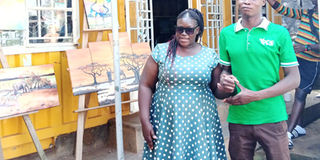Kivumbi struggling to weather pandemic effects

Kivumbi being led by Tobu, one of her guides. PHOTOs/ Beatrice nakibuuka
What you need to know:
Determined: When Ritah Namayanja Kivumbi, set out to help people with disabilities earn from their artistic talent, she did not forsee the effects of a global pandemic. She, like many businesses worldwide, is trying to pick up the pieces.
Ritah Namayanja Kivumbi was an ordinary young woman pursuing her dreams when her life changed in the course of one afternoon.
In September 2008, Kivumbi started getting frequent headaches that would only get better after medication. A month later, while at work at Makerere University, where she was an arts instructor; she developed a stiff neck, felt numbness in the left part of her body and became dizzy.
“I collapsed and this was the last time I was able to see. I was taken to several hospitals but many eye specialists failed to diagnose my problem. With no solution in sight, I decided to accept my fate and instead learn how to live with the impairment,” she says without any trace of self-pity.
Picking up the pieces
Kivumbi could not continue as an art instructor with her visual impairment. To earn a living, she started creating art that she would sell with the help of her daughter.
She says she often experienced mistreatment and unpleasantness while hawking her work. Some people would shoo her off their premises and call her names.
In addition to peddling her artwork, she continued curating art for sale at her gallery from children with disabilities. Drawing from her experience, Kivumbi also started doing art therapy in hospitals, especially at the eye clinic to empower patients who were losing sight. The people who attended these sessions felt her message was good for everyone and they started booking her to give motivational speeches for students in schools for the blind and at community outreaches to empower women to make crafts. She also became a mentor for interns at universities into growing their career in painting and crafts making. For her appearances at these events Kivumbi earned Shs100,000 to facilitate her transport and food.
All these activities came to a halt when the pandemic hit and the country got locked down. Even worse, her clientele that was made up of mostly tourists dried up. Consequently, she was unable to pay her rent for the accommodation that was conveniently close to Namirembe Guest House where her gallery is and she moved to Bweyogerere.
“Many visually impaired persons were badly affected by the lockdown since they did not receive any support from the government even as little as food. I have work and art pieces for more than 50 people unbought in store. Many of them went to their villages but still they call me to find out if I have sold any of their art pieces so I can send them some money,” she reveals.
Challenges
Transport to her gallery is too high. Since she cannot board a taxi, she has to use a boda boda to and fro which costs her Shs60,000 and then another cost to transport the guide who would walk her around.
It is very expensive for her to rent the exhibition space. “In the last exhibition, I had to pay Shs 2.5m but we did not make as much sales because not so many people came. I had to get a loan to pay because much as I tried to explain to the management of the place, they were unwilling to reduce the cost,” she recalls.
Besides the visually impaired, Kivumbi also mentors Makerere and Kyambogo University students during their internship and they paint art pieces, make crafts such as wall hangings, African printed cloth, paintings and craft work, collage, mosaic, beaded bags and jewelry which they sell at exhibitions and special events.
Since March this year, there has not been any exhibition, big day or even celebrations, so many of these remain on the shelves unsold.
Also, more visually impaired friends call her so that she can get them material that they can use to make more crafts but she does not have the money to buy the materials. Many times she has to go to the different places where she does art therapy and mentoring but since she is self- funded, she finds it very expensive.
The appeal
Kivumbi appreciates the support offered to her by Uganda Bible Society, Peacock Paints and Namirembe Guest House but also appeals to people to support her special needs people by buying their art pieces for corporate gifts, wedding gifts, getting raw materials such as paint, bring their children for skills training in art, painting and jewelry making.
“I am stuck with a lot of artwork belonging to people with disabilities. This is their livelihood. My first appeal goes to art lovers every where to come and buy their art and support these hardworking but disadvantaged members of society. This is beautiful artwork that can be used almost everywhere. Since I am unable to afford my rent for now, I appeal to places that have high traffic to avail space where our art can be displayed for the public to enjoy,” she pleads.




